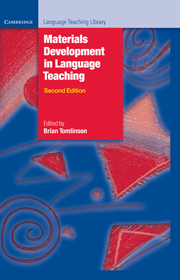Book contents
- Frontmatter
- Contents
- Preface
- Glossary of basic terms for materials development in language teaching
- Acknowledgements
- 1 Introduction: principles and procedures of materials development
- Part A Data collection and materials development
- 2 Using corpora in the language classroom
- 3 Concordances in the classroom without a computer: assembling and exploiting concordances of common words
- 4 Telling tails: grammar, the spoken language and materials development
- Comments on Part A
- Part B The process of materials writing
- 5 A framework for materials writing
- 6 Writing course materials for the world: a great compromise
- 7 How writers write: testimony from authors
- Comments on Part B
- Part C The process of materials evaluation
- 8 The analysis of language teaching materials: inside the Trojan Horse
- 9 Macro- and micro-evaluations of task-based teaching
- 10 What do teachers really want from coursebooks?
- 11 The process of evaluation: a publisher’s view
- Comments on Part C
- Part D The electronic delivery of materials
- 12 Developing language-learning materials with technology
- 13 New technologies to support language learning
- Comments on Part D
- Part E Ideas for materials development
- 14 Seeing what they mean: helping L2 readers to visualise
- 15 Squaring the circle – reconciling materials as constraint with materials as empowerment
- 16 Lozanov and the teaching text
- 17 Access-self materials
- Comments on Part E
- Conclusions
- Recommended reading
- Index
16 - Lozanov and the teaching text
Published online by Cambridge University Press: 09 February 2023
- Frontmatter
- Contents
- Preface
- Glossary of basic terms for materials development in language teaching
- Acknowledgements
- 1 Introduction: principles and procedures of materials development
- Part A Data collection and materials development
- 2 Using corpora in the language classroom
- 3 Concordances in the classroom without a computer: assembling and exploiting concordances of common words
- 4 Telling tails: grammar, the spoken language and materials development
- Comments on Part A
- Part B The process of materials writing
- 5 A framework for materials writing
- 6 Writing course materials for the world: a great compromise
- 7 How writers write: testimony from authors
- Comments on Part B
- Part C The process of materials evaluation
- 8 The analysis of language teaching materials: inside the Trojan Horse
- 9 Macro- and micro-evaluations of task-based teaching
- 10 What do teachers really want from coursebooks?
- 11 The process of evaluation: a publisher’s view
- Comments on Part C
- Part D The electronic delivery of materials
- 12 Developing language-learning materials with technology
- 13 New technologies to support language learning
- Comments on Part D
- Part E Ideas for materials development
- 14 Seeing what they mean: helping L2 readers to visualise
- 15 Squaring the circle – reconciling materials as constraint with materials as empowerment
- 16 Lozanov and the teaching text
- 17 Access-self materials
- Comments on Part E
- Conclusions
- Recommended reading
- Index
Summary
Introduction
This chapter focuses on text writing and grammatical presentation in the Lozanov method. Rewriting it for this new edition has been a rewarding experience because in the intervening years, quantum science has become more familiar, making it easier to perceive the world as Lozanov did: multidimensional, indeterminate and participative, a reality that we infl uence by the way in which we live it. This has profound implications for change in education.
Suggestopedia (SP) is a controversial method of language teaching from Bulgaria that was received with incomprehension when it surfaced in the 1960s because its claims of prodigious learning could not be explained in a way consistent with the science of the time. Nor could it be explained by its founder, psychiatrist Dr Georgi Lozanov working at the University of Sofia during the Communist regime, because as a therapist he worked from intuition, following subtle indications that emerged from interactions. Healing victims of the regime, and obliged to use hypnosis for the worst cases, he sought to find a means to bring profoundly traumatised patients ‘back to life’. What he developed through very delicate suggestion was a way of resuscitating the very essence of life – and it was the polar opposite of hypnosis, which in his experience drains away the life force. To banish the damaging implication of ‘sick’ people who needed ‘help’, he gave his therapeutic method the new goal of teaching a foreign language, and it was at that point that he discovered its extraordinary efficiency: not only did the trauma vanish but the learners learned English incredibly fast! Word spread, the government rushed in to seize the benefit of his work for the glory of Communism and a research institute was built .
The logic that Lozanov lived by is that which applies to the psychological dimension, that is subatomic and, therefore, in many ways the polar opposite of the Cartesian. To give an example, the fundamental Cartesian principle of contradiction no longer applies: things can be both A and not-A. Thus, in his teaching there are always two separate levels of effect for the teacher to negotiate: that which is conscious and that which is unconscious.
- Type
- Chapter
- Information
- Materials Development in Language Teaching , pp. 403 - 413Publisher: Cambridge University PressPrint publication year: 2011
- 1
- Cited by

